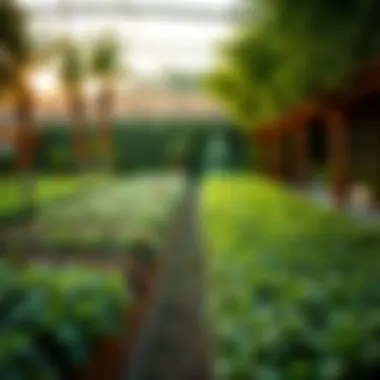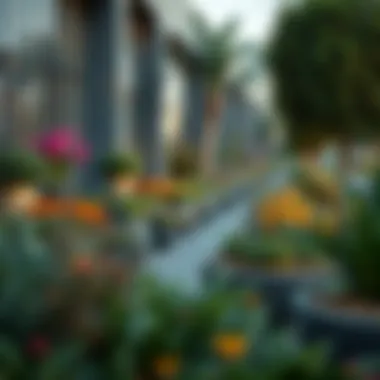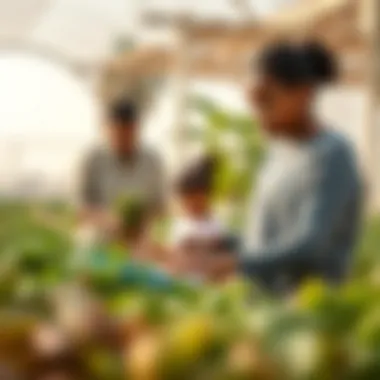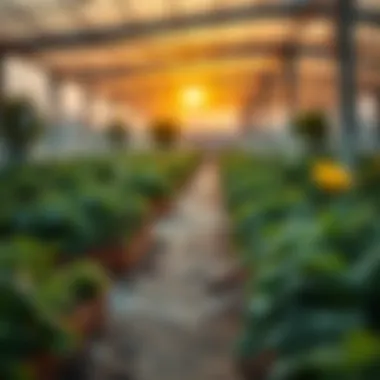Farm Gardens in Emaar Developments: A Sustainable Oasis


Intro
In the heart of Dubai's bustling urban landscape, the concept of farm gardens within Emaar developments emerges as a breath of fresh air. These thoughtfully designed spaces blend nature with modern living, providing a unique balance that benefits residents and contributes to sustainable urban growth. In a city where high-rises dominate the skyline and green spaces can seem limited, these gardens not only enhance aesthetic appeal but also foster community engagement and a sense of belonging.
As urbanization accelerates, so does the need for innovative solutions to integrate greenery into our lives. Farm gardens in these developments shine as prime examples of how to do this effectively. They serve as peaceful retreats amidst chaos, offering a space where residents can connect with nature and each other.
Moreover, the rise of such green spaces presents exciting opportunities for investors looking to navigate Dubai's real estate market. This article will explore various dimensions of farm gardens—examining their design, benefits, and the evolving market trends surrounding them.
Through an in-depth look at investment opportunities, market analysis, and future projections, we aim to deliver valuable insights that will empower investors, property managers, and real estate agents to make informed decisions in a landscape where sustainability is becoming increasingly significant.
Preface to Emaar Developments
In the bustling heart of Dubai, where glass towers scrape the sky and the desert meets innovation, Emaar Developments has carved a niche synonymous with luxury and urban sophistication. The topic of Emaar Developments is pivotal in understanding how Dubai's residential landscape is evolving. Emaar’s reputation for creating integrated communities presents a perfect backdrop for exploring the integration of farm gardens, which marks a transformative approach in urban living.
Farm gardens within these developments are not merely a green thumb's delight; they symbolize a shift towards sustainability and self-sufficiency. With urbanization rapidly consuming natural spaces, the inclusion of such gardens brings forth a breath of fresh air, amidst the concrete monoliths that characterize the modern cityscape. These gardens offer multifaceted benefits that encompass not just aesthetic pleasure but also promote environmental stewardship, enhance community engagement, and potentially boost property values. By establishing a connection with nature, residents can partake in fresh produce and embrace a sustainable lifestyle, making this an essential element worthy of exploration.
The strategic placement of farm gardens in Emaar projects represents a thoughtful intersection of sustainability and urban design. These spaces serve as a reminder that even within the confines of a vibrant city, one can cultivate a connection to the earth. Understanding the broader vision behind Emaar Developments casts a spotlight on how they foresee the future of urban living—an intricate blend of modernity and green spaces. As we delve deeper into the specifics of farm gardens in Emaar, it’s vital to first grasp the fundamentals of Emaar's operations and the core principles that guide their ambitious projects.
Overview of Emaar Properties
Founded in 1997, Emaar Properties has positioned itself as a powerhouse in real estate development, with a portfolio that spans residential, commercial, and retail spaces. The company is famous for iconic structures such as the Burj Khalifa and the Dubai Mall, establishing its reputation as a leader in creating landmarks and lifestyle hubs. Not just confined to Dubai, Emaar has expanded its reach to international markets, bringing its touch to various corners of the globe.
Emaar aims to blend quality craftsmanship with cutting-edge innovation. Each project they undertake reflects a commitment to luxury, community, and sustainability. This balance is key, especially as urban communities grapple with the challenges of space and environmental concerns. Emaar's properties often feature a mix of high-rise living and serene landscapes, making it an attractive option for both investors and residents.
Vision and Mission of Emaar
Emaar’s vision centers around leading the real estate industry by creating unparalleled livable spaces that fulfill the needs of diverse communities. The company’s mission emphasizes delivering high-quality developments that inspire and enhance the quality of life. This core belief drives Emaar to pursue innovative projects that resonate with contemporary lifestyles while being mindful of sustainability.
"Emaar’s mission reflects a deep commitment to shaping a better future through sustainable development, fostering community spirit, and enhancing urban living."
The vision aligns with global trends that favor sustainable practices, indicating that Emaar develops not just for today, but with an eye toward future generations. Achieving this mission involves integrating eco-friendly technologies and amplifying green initiatives, which explains the incorporation of farm gardens in their real estate designs. This not only meets the rising demand for greener living options but also plays a significant role in potential property value appreciation, compelling both buyers and investors to take note.
The Concept of Farm Gardens
The notion of farm gardens has undergone a transformation in recent years, increasingly recognized as pivotal to urban development, particularly within Emaar's comprehensive projects in Dubai. This concept emphasizes more than mere aesthetics; it encapsulates practicality, community engagement, and a step towards sustainability. Farm gardens function as vital pockets of greenery amidst the concrete sprawl, offering numerous benefits and considerations, which makes them an integral part of today's urban landscape.
Defining Farm Gardens
Farm gardens are essentially small-scale agricultural endeavors situated within urban environments, designed to cultivate various crops, herbs, and plants directly in neighborhoods or residential areas. These spots can take various forms, whether personal vegetable patches, community gardens, or organized farming within housing developments.
Key characteristics of farm gardens include:
- Location: Often strategically placed in residential areas, providing easy access for local residents.
- Diversity: A range of plants is typically grown to maximize yield and biodiversity.
- Sustainability: Designed with eco-friendly practices in mind, utilizing methods that conserve resources and minimize waste.


Farm gardens allow individuals to grow their produce, fostering a sense of ownership and responsibility towards their immediate environment. They’re not merely green spaces; they symbolize a shift in urban living, where people become more connected to their food sources and local ecosystems.
Historical Context of Urban Agriculture
Urban agriculture is not a new phenomenon; it has roots that dig deep into history. As cities expanded and populations grew, various forms of farming emerged within urban settings, adapting to the needs of city dwellers.
Historically, community gardens and allotments became particularly popular during the World Wars, when local food production was imperative due to rationing and supply chain issues. Fast forward to the 21st century, and there's been a resurgence in urban agriculture, rekindled by the growing consciousness regarding food security, sustainability, and healthy living.
In cities like Dubai, where desert landscapes meet innovation, integrating farm gardens has become a focal point for new developments. This alignment between residential properties and agricultural practices fosters an atmosphere of community while addressing pressing environmental concerns.
"In a world where urbanization is ever-increasing, farm gardens play a crucial role in ensuring that greenery and agriculture remain at the forefront of city life."
Notably, the move towards urban agriculture also mirrors broader global trends, with cities worldwide embracing their own farm initiatives, proving that such concepts are both viable and vital. As developments from companies like Emaar flourish, they embrace this historical context, ensuring that farm gardens are not just an afterthought but a planned aspect of residential living.
Integration of Farm Gardens in Emaar Projects
The integration of farm gardens into Emaar's urban developments symbolizes more than just beautifying the landscape; it represents a conscious shift toward sustainable living and a deeper connection between residents and their environment. Emaar understands that in today’s fast-paced world, people crave green spaces that contribute not just to aesthetics but to wellness and community cohesion. Incorporating farm gardens allows for initiatives that encourage local food production, recreational opportunities, and interaction amongst residents, making them an indispensable aspect of Emaar's vision.
Incorporating these gardens doesn’t come without its challenges. Urban planners need to navigate land-use policies, consider space constraints, and address concerns regarding community interests. However, the benefits for both the environment and property values make these endeavors worthwhile. Farm gardens do not merely push the envelope of design; they redefine functional urban living.
Design Principles in Emaar Farm Gardens
The design principles for Emaar's farm gardens focus on several core elements that ensure the spaces are both functional and inviting. First and foremost is the integration of native plant species. By selecting plants that are well-adapted to the local climate, Emaar promotes biodiversity and reduces the need for irrigation. Creating zones within the gardens—such as vegetable patches, pollinator gardens, and sensory areas—encourages varied interactions.
Another design principle is accessibility. Gardens are designed to be inclusive, aimed at all age groups and abilities. Raised beds for elderly residents and pathways wide enough for wheelchairs highlight Emaar's commitment to community inclusivity. Moreover, these gardens incorporate environmentally-friendly practices such as composting and rainwater harvesting, fostering an eco-conscious lifestyle.
The harmony between beauty and practicality serves as a tactile reminder of nature, evident in the winding pathways and water features that invite strolling and contemplation.
Key Emaar Developments Featuring Farm Gardens
Several significant Emaar developments showcase the successful integration of farm gardens, demonstrating the trend’s viability. In the sustainable community of Dubai Hills Estate, numerous farm gardens play a role in improving local air quality while offering a space for community events, such as potlucks where residents share meals made from locally sourced produce.
Another prime example is the Arabian Ranches III, where a series of community gardens promote both social interaction and hands-on learning about urban agriculture. The design encourages children to engage with nature and learn about sustainable practices, effectively nurturing future stewards of the environment.
Each of these developments serves as a blueprint for integrating farm gardens within urban settings. They reinforce that the addition of green spaces can elevate property values while fulfilling the growing consumer desire for health-oriented, experiential living environments.
Benefits of Farm Gardens
Farm gardens have become increasingly relevant in urban landscapes, especially in developments like those spearheaded by Emaar Properties. The significance of farm gardens in these modern urban settings cannot be understated. They offer a cornucopia of benefits, impacting everything from property values to community well-being. In this section, we delve into the specific advantages of integrating farm gardens into urban environments, focusing on sustainability, biodiversity, and community interaction.
Enhancing Urban Sustainability
The integration of farm gardens into Emaar developments serves as a testament to urban sustainability. These gardens play a crucial role in managing urban heat, improving air quality, and reducing the carbon footprint of residential areas. One could say they are nature's way of giving the concrete jungle a much-needed breath of fresh air.
Using native plants and organic practices, these gardens minimize the need for chemical fertilizers and pesticides, promoting a healthier ecosystem. Homeowners can engage in community-supported agriculture (CSA), providing fresh produce that doesn't have to travel far from farm to table. This method drastically reduces transportation emissions and packaging waste, which is something investors could highlight to potential buyers.


Moreover, the emphasis on water conservation through drip irrigation and rainwater harvesting in these farm gardens is essential as regions face water scarcity. The concept of sustainability is not just a buzzword here; it's a necessary approach to modern living.
Promoting Biodiversity
Biodiversity is the backbone of any sustainable ecosystem, and farm gardens within Emaar's developments contribute significantly to that. By incorporating a variety of plants, these gardens create habitats for numerous species, including birds, insects, and beneficial microorganisms. They essentially become mini-ecosystems that support life in an otherwise urban setting.
The use of pollinator-friendly plants can help increase local bee populations, which are critical for food production. This dynamic is vital for both ecological health and agricultural endeavors. Additionally, diversity in plants can enhance soil health and resilience, making these gardens more sustainable and productive over time.
"Biodiversity is not just about variety; it's about creating balance in our environment."
Thus, investors looking into units in areas with farm gardens can understand that they are buying into a community that prioritizes ecological health.
Fostering Community Interaction
Community is where the heart is, and farm gardens provide a unique setting for fostering interaction among residents. These gardens act as social hubs, where neighbors can collaborate, share resources, and exchange knowledge. This can lead to a stronger sense of belonging, which is often lacking in urban environments.
Workshops on gardening, sustainability, and healthy living can be hosted in these spaces, transforming them into educational centers as well. Children can learn about nature firsthand, creating a new generation who appreciates the environment. Emaar projects often highlight social interaction as a core value, and farm gardens are a natural extension of this philosophy.
Moreover, farm gardens are areas where cultural exchange can flourish. Community members from diverse backgrounds can come together, share their recipes, and introduce their gardening techniques. This aspect can lead to the creation of resilient, inclusive societies within urban settings.
In summary, the benefits of farm gardens in Emaar developments stretch far and wide. They are not just patches of greenery; they are lifelines that enhance sustainability, promote biodiversity, and foster community interaction. Integrating such essential elements not only boosts urban living but also aligns with the growing demand for environmentally-conscious lifestyles.
Economic Aspects of Farm Gardens
The economic aspects of farm gardens within Emaar developments carry substantial weight in shaping the future of urban living in Dubai. Understanding these factors can provide insight not only for investors but also for property managers and anyone involved in the real estate market. Farm gardens are emerging as valuable elements in enhancing property values and presenting new investment opportunities. As urban agriculture takes root, it becomes increasingly relevant to explore its financial implications in the vibrant landscape of Emaar’s properties.
Impact on Property Value
One cannot underestimate the role that farm gardens play in boosting property values. In the competitive real estate market of Dubai, unique selling propositions are necessary to stand out. The aesthetic appeal of lush greenery and the utility of farm gardens can significantly elevate the allure of residential and commercial properties.
Research indicates that properties featuring eco-friendly gardens often experience a premium—sometimes as much as 15-20%—over those without such amenities. This is particularly true for potential buyers who are increasingly valuing sustainability.
- Increased Curb Appeal: Homes and developments enriched with farm gardens create inviting environments that contribute to a community’s overall appeal.
- Healthier Living Environment: Access to fresh produce and green spaces not only promotes well-being but can also reduce living costs when homeowners can supplement their grocery needs.
- Market Differentiation: Properties in Emaar developments featuring farm gardens set a precedent that distinguishes themselves from other developments, making them more attractive to discerning buyers.
"The best investment on Earth is earth itself."
Investment Opportunities in Urban Agriculture
With the shifting paradigms in food consumption and sustainability, urban agriculture presents unique investment avenues that can appeal to forward-thinking investors. Here are some promising aspects to consider:
- Rising Demand for Local Produce: The growing trend of farm-to-table dining experiences is reshaping consumer preferences. Restaurants and grocery stores that prioritize local produce offer a lucrative market for urban farm garden outputs.
- Sustainability Projects: Emaar’s commitment to sustainability opens the door for partnerships in developing farm garden initiatives. Investors can look toward funding innovative projects that align with environmental goals.
- Community Engagement Initiatives: Farm gardens foster community relationships. Investing in these spaces not only supports local economies but also encourages a sense of belonging among residents.
- Potential for Tourism: As Dubai becomes a hub for tourism, farm gardens can be marketed as attractions, providing chances for guided tours or workshops, contributing to revenue generation.
Challenges in Implementing Farm Gardens
In the urban environments fostered by Emaar developments, the inclusion of farm gardens poses distinct challenges that must be carefully navigated. Understanding these hurdles is pivotal for stakeholders in real estate, local governments, and community activists alike. A farm garden, while an oasis of greenery and sustainable practice, requires thoughtful planning and execution. There’s no doubt that addressing these challenges directly correlates with the success and sustainability of such green spaces.


Space Limitations in Urban Environments
The most apparent hurdle when it comes to establishing farm gardens within densely populated areas is, quite simply, space. Emaar developments, known for their luxurious amenities and sprawling layouts, also contend with the high demand for residential and commercial units. The premium placed on real estate often leaves little room for green initiatives.
When envisioning an urban farm, one must consider not just the size of the plots but also their accessibility. Roof gardens or vertical farming could be seen as potential solutions, enabling agricultural practices without sacrificing real estate. These methods can maximize the space allotted for farming while ensuring that individuals benefit from fresh produce without having to venture far from home.
"Space is the final frontier, particularly in urban farming. Finding every last square inch to maximize productivity is crucial in these settings."
Elements such as design and layout become critical. There isn't a one-size-fits-all approach; each garden must be tailored to its location. Factors like sunlight, proximity to water, and soil viability need to be considered meticulously. For instance, having a garden on the rooftop of a multi-story Emaar building demands a different approach than one situated on the ground floor. Ultimately, to make farm gardens truly viable, they must be integrated into the urban planning process, rather than viewed as an afterthought.
Maintenance and Management Issues
Once farm gardens are established, the challenges don’t stop there. Maintenance is a significant consideration that can make or break the success of these initiatives. Maintaining a farm garden requires ongoing commitment, resources, and expertise. Many urban dwellers lack the necessary skills or time to effectively care for a garden; hence, organizations that specialize in urban agriculture can be invaluable partners in this endeavor.
Regular upkeep, pest management, and crop rotation are just a few aspects that require a dedicated approach. For urban farms in Emaar developments, management also includes forming tactical partnerships with local businesses and volunteers to support the maintenance of these green spaces. Engage the community to ensure that everyone has a vested interest in the upkeep of urban gardens, thereby fostering a sense of ownership and responsibility.
To illustrate, consider a scenario where a community garden managed by a local non-profit encounters neglect due to lack of attendance. The crops may fail, and the area may devolve into a neglected patch. Not only does this hinder the initial project goals of sustainability, but it can also undermine community engagement and destroy the initiative’s original purpose.
Future of Farm Gardens in Dubai
The future of farm gardens in Dubai is not only promising but also essential in addressing the urban challenges facing this vibrant city. As urban populations grow and the demand for green spaces increases, the integration of farm gardens within developments by Emaar represents a critical response to these trends. This section will highlight emerging trends in urban agriculture and discuss potential developments from Emaar that can enhance the livability and sustainability of Dubai.
Emerging Trends in Urban Agriculture
Urban agriculture has seen a spike in interest in recent years, driven by growing awareness of food security, environmental sustainability, and community well-being. Several key trends are shaping the future of this industry:
- Vertical Gardening: As urban areas often face land constraints, vertical gardening offers a practical solution. By utilizing vertical space, Emaar developments can incorporate lush greenery that maximizes food production.
- Hydroponics and Aeroponics: These soil-less farming techniques allow for efficient water usage and faster growth rates. They're ideal for Dubai’s climate, where water conservation is paramount. Implementing hydroponic systems in Emaar's farm gardens can yield fresh produce while conserving resources.
- Community Involvement: Increasingly, developments are recognizing the value of involving communities in farming initiatives. Engaging residents in gardening activities not only empowers them but also fosters a sense of ownership and responsibility towards shared spaces.
- Sustainability Practices: The emphasis on organic, pesticide-free gardening aligns with broader goals of sustainability that Emaar aims to promote. This approach not only supports health but also enhances the aesthetic and ecological value of the gardens.
"Farm gardens serve as a beacon of biodiversity and sustainability, providing a much-needed green lung in densely populated urban areas."
Potential Developments from Emaar
Looking ahead, it is clear that Emaar is well-positioned to lead the charge in developing innovative farm gardens that contribute to the urban fabric of Dubai. Some developments to anticipate include:
- Smart Gardens: With the advancement of technology, Emaar may introduce smart gardening solutions, utilizing sensors and automated systems to monitor plant health and optimize resource use.
- Enhanced Community Spaces: Future developments could include multifaceted community hubs where residents come together to grow food, share knowledge, and participate in workshops, thus enriching social interactions.
- Partnerships with Local Farmers: Collaborations with local farmers can help promote traditional farming methods alongside modern techniques, creating a hybrid approach that respects local heritage.
- Educational Programs: By integrating educational programs within their developments, Emaar could foster a new generation that values agriculture. Schools and local organizations could partner in initiatives to teach sustainable farming practices.
Ending
In wrapping up our exploration of farm gardens within Emaar developments, it’s essential to underscore the significant role they play in enhancing urban living in Dubai. Not only do these verdant spaces offer visual appeal, but they also deliver practical benefits that resonate deeply with sustainability and community engagement.
Summary of Key Insights
Farm gardens contribute to urban sustainability by reducing the carbon footprint and promoting local food production. Their design principles, rooted in innovation and ecological awareness, showcase how urban spaces can integrate nature seamlessly into everyday life. Additionally, farm gardens serve as biodiversity havens, fostering various species and contributing to ecological balance.
Moreover, the economic implications are compelling. Properties featuring these greenery-laden spaces often see an uptick in property values, as modern residents are increasingly seeking developments that prioritize eco-friendliness and community-oriented features. Investors and property managers should recognize that incorporating farm gardens isn't just about aesthetics; it signals a commitment to a sustainable future and can result in lucrative returns.
Call to Action for Stakeholders
For stakeholders involved in real estate, urban planning, and community development, it is vital to embrace the farm garden concept wholeheartedly.
- Invest in Research: Support studies that evaluate the long-term benefits of farm gardens on residential satisfaction and environmental health.
- Collaborate with Communities: Work hand-in-hand with local communities to tailor farm gardens to their needs, fostering ownership and commitment.
- Promote Awareness: Organize workshops and informational sessions about the advantages of urban agriculture, thereby increasing public interest and involvement.



